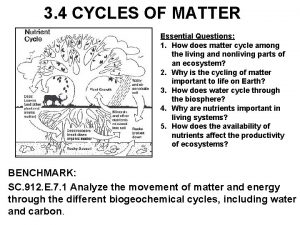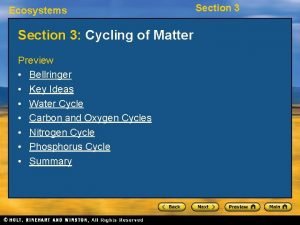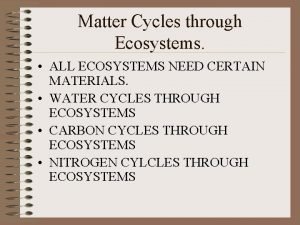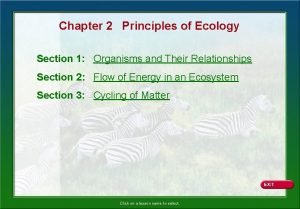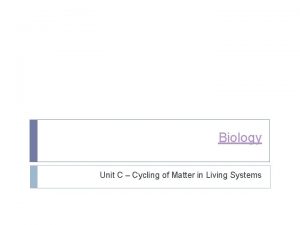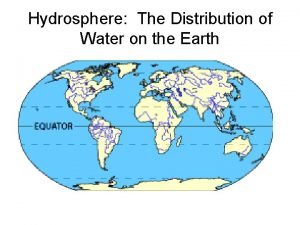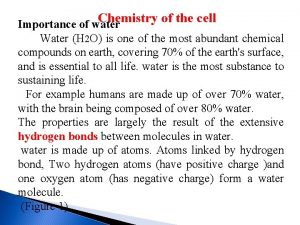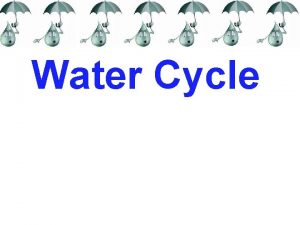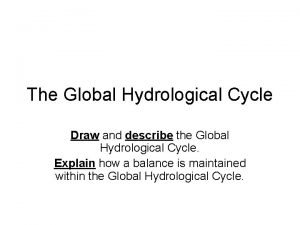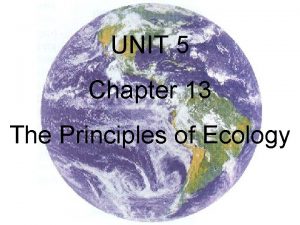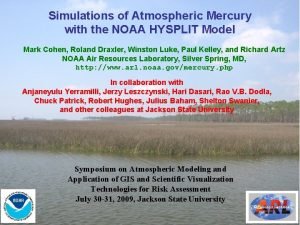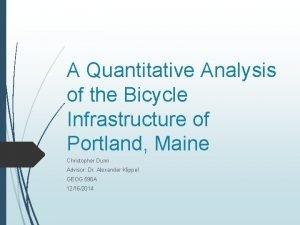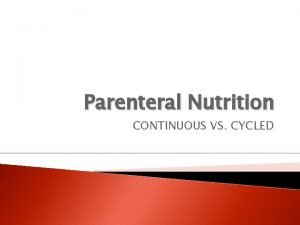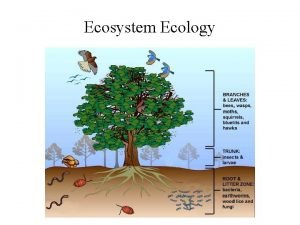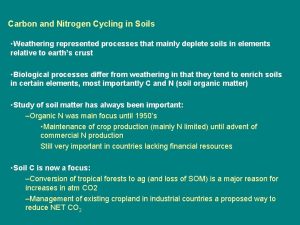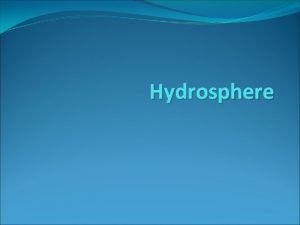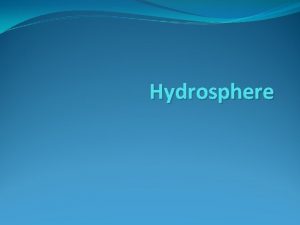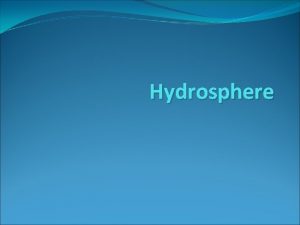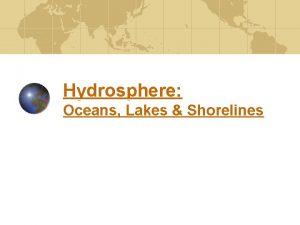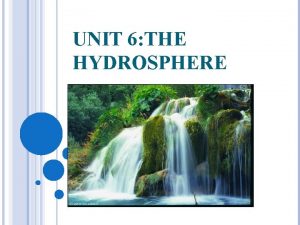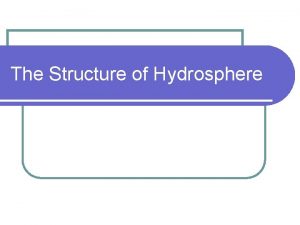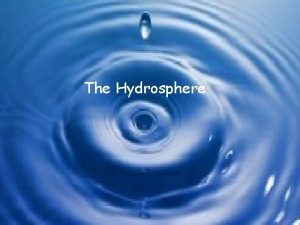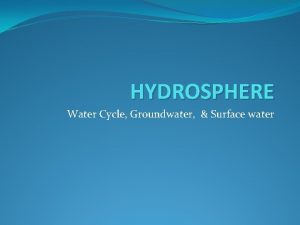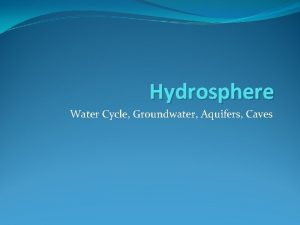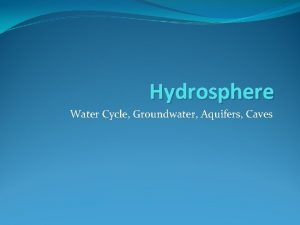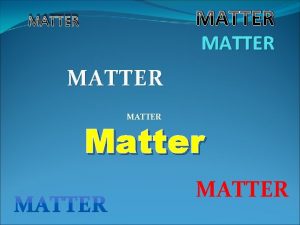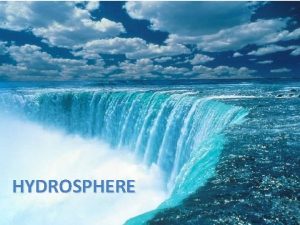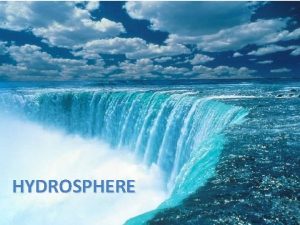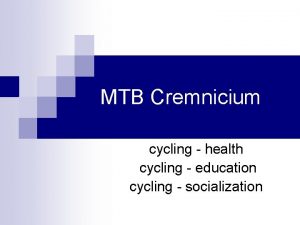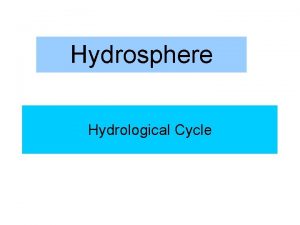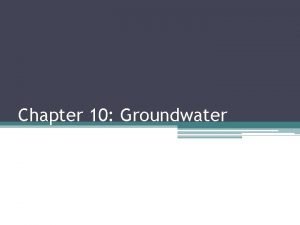Cycling of Matter Water Cycle Hydrosphere water of




















- Slides: 20

Cycling of Matter

Water Cycle • Hydrosphere- water of Earth’s surface • Water Cyclemovement of water in the hydrosphere, driven by sunlight

Hydrological Cycle


Biochemical Cycles • • Oxygen Carbon Nitrogen Phosphorous

Nitrogen & Carbon Cycle

Nitrogen Cycle • Describes the transformations of nitrogen and nitrogencontaining compounds in nature. It is a cycle which includes gaseous components. • Earth's atmosphere is about 78% nitrogen, making it the largest pool of nitrogen. • Nitrogen is essential for many biological processes; it is crucial for any life here on Earth. It is in all amino acids, is incorporated into proteins, and is present in the bases that make up nucleic acids, such as DNA and RNA.

Nitrogen Cycle Movement of Nitrogen between atmosphere, bacteria and other organisms

Oxygen Cycle • the movement of oxygen within and between its three main reservoirs: • atmosphere (air), • biosphere (living things) • lithosphere (Earth's crust). • The main driving factor of the oxygen cycle is photosynthesis, which is responsible for the modern Earth's atmosphere and life.

Oxygen Cycle


Carbon Cycle The cycle is usually thought of as four major reservoirs of carbon interconnected by pathways of exchange. These reservoirs are: • The atmosphere. • The terrestrial biosphere, which is usually defined to include fresh water systems and non-living organic material, such as soil carbon. • The oceans, including dissolved inorganic carbon and living and non-living marine biota, • The sediments including fossil fuels


Phosphorous Cycle • Describes the movement of phosphorus through the lithosphere, hydrosphere, and biosphere. • Unlike many other biogeochemical cycles, the atmosphere does not play a significant role in the movements of phosphorus, because phosphorus and phosphorus-based compounds are usually solids at the typical ranges of temperature and pressure found on Earth.


Natural Leaching

Human Impact

Phosphorus Cycle Movement of phosphorus from the environment to organisms and back


United Streaming videos • http: //search. discoveryeducation. com/inde x. cfm? Nty=1&Ntx=mode+matchallpartial& Ntk=All&Nr=AND(OR(d_Apr: Yes), OR(d_M edia_Group_Key: 40698 C 4 B, d_Media_Group_Key: 448 EBA 21, d_Media_Group_Key: 4 D 27 BFE 5), NOT(d_Asset_Type: CMRP))&N=0 &No=0&Ntt=chemical%20 cycles
 Cycling of matter in an ecosystem
Cycling of matter in an ecosystem Section 3 cycling of matter
Section 3 cycling of matter Principles of ecology section 3 cycling of matter
Principles of ecology section 3 cycling of matter Matter cycling in ecosystems
Matter cycling in ecosystems Principles of ecology chapter 2 section 1 answer key
Principles of ecology chapter 2 section 1 answer key Chapter 2 principles of ecology test answers
Chapter 2 principles of ecology test answers Cycling of matter definition biology
Cycling of matter definition biology Water covers earth surface
Water covers earth surface Water and water and water water
Water and water and water water Brainpop carbon cycle
Brainpop carbon cycle Water cycle the hydrologic cycle
Water cycle the hydrologic cycle Biogeochemical cycling ensures that
Biogeochemical cycling ensures that Cycling swanier
Cycling swanier Quantitative research about cycling
Quantitative research about cycling Tpn tapering guidelines
Tpn tapering guidelines Energy flow and material cycling in ecosystem
Energy flow and material cycling in ecosystem Cycling event sponsorship proposal
Cycling event sponsorship proposal Road cycling 101
Road cycling 101 Buying using and disposing
Buying using and disposing Carbon and nitrogen cycling in soil:
Carbon and nitrogen cycling in soil: Fotcc
Fotcc
